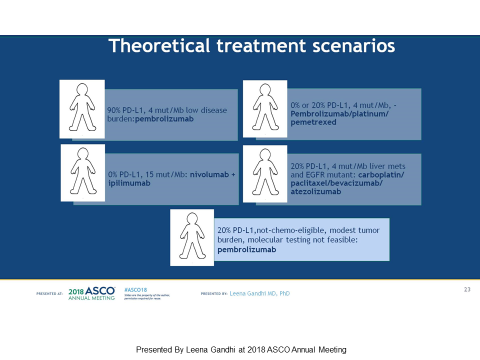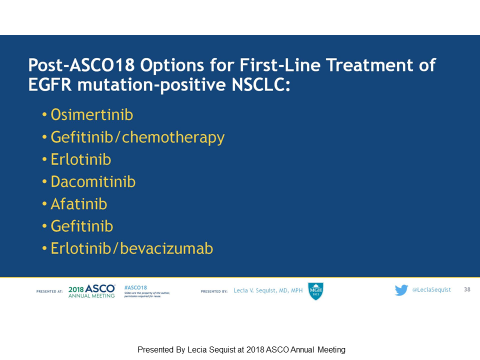By Jennifer C. King, PhD, Director of Science and Research at Lung Cancer Alliance
Expanding the Reach of Precision Medicine
Lung cancer research was everywhere at the American Society of Clinical Oncology (ASCO) conference held June 1-5. The ASCO President, Bruce E. Johnson, MD, contrasted this meeting with the one in 2000 when the most significant lung cancer talk only compared four chemotherapy combinations.
Personalized care was a major theme this year—lung cancer should not be lumped together and treated as one disease.
Immunotherapy
Data on lung cancer immunotherapy was presented throughout the meeting and highlighted at the key session of the conference attended by most attendees, the plenary. Immunotherapy for lung cancer is becoming like targeted therapy, where testing biomarkers in the cancer helps inform treatment decisions. Here are a few of the advances that were presented:
- Keytruda (pembrolizumab) alone as a first treatment significantly improved survival for patients with a high level of the PD-L1 protein in their cancer and with fewer side effects. Results were less impressive when cancers had less of the biomarker. (KEYNOTE-042)
- New, different combinations of immunotherapy and chemotherapy had positive results in additional types of lung cancers. (IMPOWER150; KEYNOTE-407; IMPOWER131) Notably, patients who had EGFR and ALK mutations responded to a Tecentriq (atezolizumab)/Avastin (bevacizumab)/chemotherapy combination.
- An immunotherapy/immunotherapy combination of Opdivo (nivolumab) and Yervoy (ipilumumab) improved survival for those without PD-L1, but who had a new biomarker of high tumor mutational burden. (CHECKMATE 227)
- Immunotherapy showed some benefit for patients with small cell lung cancer – response rates were not high (<20%) but those who did respond had a long duration of response (73% for greater than 1 year). (KEYNOTE-158)
- A combination of the immunotherapy Imfinzi (durvalumab) with chemotherapy showed promising early results in malignant pleural mesothelioma. (DREAM)

In short, immunotherapy is no longer “one size fits all” just like targeted therapy. We highly encourage patients to have informed conversations with their treatment team and talk to them about what treatment options might be right for them. If you have questions about treatment options, please contact our LungMATCH specialists.
Targeted Therapy
Options continue to expand in the targeted therapy space too. We heard some excellent talks on how to use the expanding classes of ALK and EGFR targeted drugs along with other newer targets. Some new data presented included the following:
- A new drug targeting RET fusions showed an excellent response rate (77% of NSCLC patients) (Abstract). This data along with data presented recently at AACR are giving options to patients with RET-altered cancer.
- Multiple studies for lung cancer with EGFR mutations revealed new potential treatment options. A new drug, dacomitinib, improved survival for patients compared to Iressa (gefitinib) (ARCHER 1050). Studies combining Iressa with chemotherapy (NEJ009) or Tarceva (erlotinib) with Avastin (NEJ026, J025567) also showed positive results. Unfortunately, none of these were compared directly to Tagrisso (osimertinib) which is the currently recommended standard of care in the U.S., but they do provide a number of new options for patients.

Early Detection
Lung cancer is much more curable when found at an early stage so research into early detection is very important. It is also a key pillar of Lung Cancer Alliance’s work.
- One study showed that uptake of lung cancer screening implementation has been low so far and suggested that a number of approaches including public awareness and provider education are needed to improve lung cancer mortality.
- Early data was presented showing the potential for future blood-based lung cancer detection. (CCGA).
Along with the advances in non-small cell lung cancer, we had several conversations about ongoing small cell lung cancer research. We look forward to seeing future results.
In summary, ASCO 2018 made it clear that lung cancer research will continue to lead to new, personalized treatments for this disease in its many forms. Breakthroughs made in lung cancer are now informing research in all cancers.
Watch this short video on the team’s impressions from their time at ASCO!
For help navigating all these new treatment and trial options, contact our LungMATCH specialists at 1-800-298-2436 or email support@go2.org.
The ASCO Immediate Past President, who presided over this meeting, Dr. Bruce Johnson will be at speaking at our National Advocacy Summit in Washington, DC from July 10-12. Register today!

Nice post.
Immunotherapy is very interesting and it’s great to see the ideas of not lumping all cases into one treatment protocol.
Great write up, very informative!